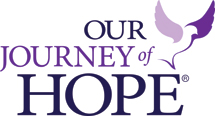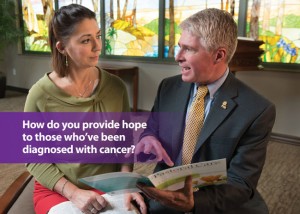By Ann-Margret Hovsepian
 “Cancer is beatable, treatable and survivable,” said Rev. Percy McCray, his eyes lighting up as he shared this deep conviction. McCray, Director of Faith-Based Programs for the Cancer Treatment Centers of America, hasn’t had any family members affected by cancer, yet he has been a champion for cancer patients for some 20 years and serves as Director of Pastoral Care at Our Journey of Hope (OJOH), a cancer care ministry and leadership training provider based in Chicago.
“Cancer is beatable, treatable and survivable,” said Rev. Percy McCray, his eyes lighting up as he shared this deep conviction. McCray, Director of Faith-Based Programs for the Cancer Treatment Centers of America, hasn’t had any family members affected by cancer, yet he has been a champion for cancer patients for some 20 years and serves as Director of Pastoral Care at Our Journey of Hope (OJOH), a cancer care ministry and leadership training provider based in Chicago.
“The common denominator for me is that cancer patients are some of most courageous people I know,” McCray explained, “and, coming from inner city Chicago, I understand the fighting spirit.”
McCray played a major role in the establishment of Our Journey of Hope. “A patient I was supporting was doing really poorly,” he said. “As a result of the pastoral care she received, she came back a month later completely changed and asked if I’d be willing to speak to her pastor about what I do. From there, what became very clear and apparent is that pastors may have the desire to reach out to cancer patients but they don’t always have the tools or necessary training out of Bible college. I could bridge that gap.”
OJOH’s two-day Cancer Care Leadership Training program provides Bible-based resources to pastors who want to develop a cancer care ministry within their congregations, equipping them to train other leaders through an eight-week program. What makes this program accessible to all ministers is the cost: the training is completely free, including lodging, meals and materials. Available in five cities (Atlanta, Chicago, Philadelphia, Phoenix and Tulsa), the seminars arm participants with small group curriculum, extensive online resources, video lessons, an online community and ongoing leadership resources.
OJOH can offer this training at no cost because the program is fully sponsored and paid for by the Cancer Treatment Centers of America, though CTCA is not a Christian organization.
“I had a forthright conversation with the CEO,” said McCray. “A large percentage—about 80%—of our cancer patients self-identify as evangelicals. God said to me: ‘Take care of my people, what is precious to me. If you do, I’ll take care of your organization, what is precious to you.’”
McCray asked and he received. “From top to bottom, CTCA has committed to operation, execution and promotion of this program. My cry is that we should not ask any local church for one penny.”
Within the last two years, OJOH has engaged 500 ministers in 300 churches, and well over 100 cancer care ministries have been launched. “We’ve seen a great proliferation of impact,” said McCray. “Beyond that, individuals who were once struggling with cancer are now leading that charge on the frontlines, supporting other patients with great credibility.”
 Still, getting churches on board with the training program is sometimes a challenge, said McCray, explaining that a ministry focused on cancer “is not sexy.” “There’s no razzle-dazzle,” he said. “Churches tend to facilitate ministries that have some cachet to them. This is a hard ministry to start with because of fears surrounding cancer. Getting more people engaged is a challenge because they have to work through the mental stigma of cancer, death and dying. It’s not glamorous. It’s really hard work.”
Still, getting churches on board with the training program is sometimes a challenge, said McCray, explaining that a ministry focused on cancer “is not sexy.” “There’s no razzle-dazzle,” he said. “Churches tend to facilitate ministries that have some cachet to them. This is a hard ministry to start with because of fears surrounding cancer. Getting more people engaged is a challenge because they have to work through the mental stigma of cancer, death and dying. It’s not glamorous. It’s really hard work.”
The training material addresses coping with patients who pass away and strives to equip participants to embrace and deal with potentially losing people they’ve become attached to and love.
Though he was instrumental in developing OJOH’s training program, today McCray focuses more on its public relations and operational aspects. “I constantly ask: Is it current, relevant, efficient and effective?”
His desire is to see every local church in America have some kind of cancer care ministry because, as he points out, in every church there are three categories of people: those who are going to get cancer, those who have cancer or those who are at the end of dealing with cancer. He estimates that cancer diagnoses will double to about 15 million people by 2020.
“We need to be equipped to deal with these issues,” said McCray. “Just as Sunday School is a common conversation in every church, I want this to be a common conversation. We’ve got a long way to go. I will have a job for quite a while.”
To learn more about Our Journey of Hope, visit www.ourjourneyofhope.com or call 1-888-399-8126.
Ann-Margret Hovsepian is a freelance writer. Visit www.annhovsepian.com.







